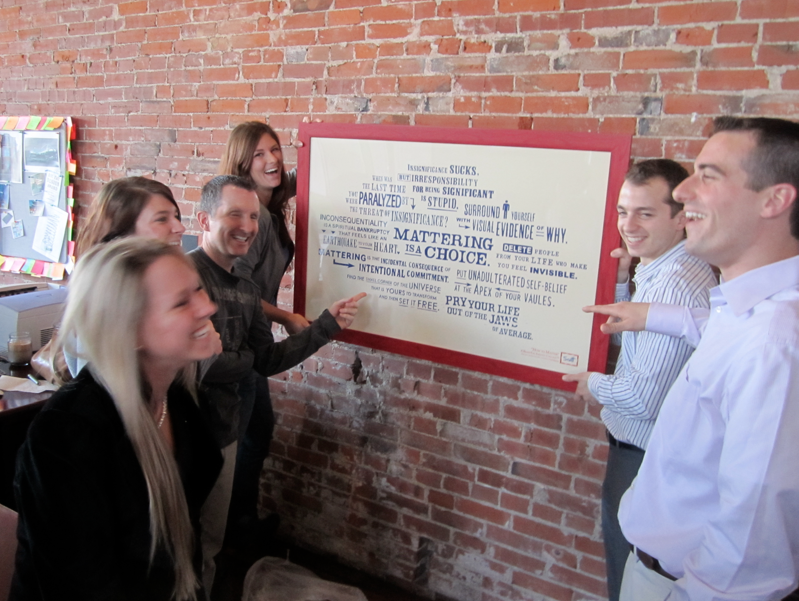
 You’ve chosen an uncertain path.
You’ve chosen an uncertain path.
You’ve adopted an inconvenient lifestyle.
You’ve embarked upon an unconventional journey.
You’ve felt the voice inside you growing more urgent.
You’ve committed yourself enough so you can’t turn back.
IN SHORT: You’ve decided to play for keeps.
This is the critical crossroads – the emotional turning point – in the life of every young artist.
I’ve been there myself. I’m still there myself. I even wrote a book on it. But for now, here’s what I’ve learned lately:
1. Bring life to what might be. We can curate, opinionate, calculate, commentate, evaluate and instigate until we’re blue in the face. But only when we round the work out, only when we actually create, physically bring life to something new, from scratch, from our hearts and for the entire world to see, can we have the greatest possible impact. Hugh
MacLeod is a hero of mine. He said that if all our songs are about
writing songs, we shouldn’t expect anyone to listen to them. He said the problem
with writing about creativity is that it’s usually more lucrative than actually
being creative. Guilty. As someone who’s written and
spoken extensively on artistic topics like brain candy, playing for keeps and
writing is basis of all wealth, Hugh’s message is a timely reminder to keep the
ratio down with my own work. I remember that my primary responsibility as an
artist is to actually make good, interesting stuff. Is your creation
subordinate to anything?
2. Pick your punctuation wisely. The
problem with everybody having a voice is, nobody remembers how to be a good
audience anymore. When we walk into a room, enter into a conversation, tune
into a program, sit down with a book or log in to an online community, most of
us are looking to validate our views, not welcome something new. This posture
hurts us. It suffocates our curiosity, limits our learning and lowers our
receptivity to new ideas that might be better than the ones we’ve already
convinced ourselves are the truth. Personally, I want to be disturbed. I want
to be provoked. I want to be called on my shit. I want to be confronted by
something so contrary to my train of thought, so far outside of my comfort
zone, that I have no choice but to be changed forever. After all, that’s why we
deploy our voice the first place: To move people. Seems to me, if we plan on
taking the stage, taking the page or taking the airwaves, then being a good
audience member is the other half of the job description. Otherwise we’re just
a world of exclamation points. What punctuation
are you?
3. Bad isn’t good, bad breeds good. My
parents always said that I was an unplanned pregnancy. That used to bother me,
until I learned that many of the world’s most important inventions were
accidents. Chocolate
cookies, rubber tires, hot tea, pacemakers, waffle cones, paper towels, maple
syrup, penicillin, soap bars, stainless steel, all accidents. Purpose, schmurpose.
Besides, who are we to judge if an idea is good? That’s not our job. As
artists, our job is to notice. As artists, our job is to render our unique
experience. As artists, our job is to treat everything we discover with deep
democracy. Only time will tell if it’s any good. Millions of people thought
Christianity was a bad idea – but they still wrote it down. Later, over the
course of hundreds and thousands of years, that idea went on to change the
world forever. How many bad ideas did you
have last week?
4. Geographic displacement fuels
creativity. Sometimes size really does matter.
About a year ago, we began a conversation about relocating. It was a massive
shock, but to my delight, the mere idea of moving to a big city gave me
permission to think bigger. Even before we physically relocated, my creativity
had already left town. Ever since then, I’ve been chasing down ideas that the old
version of my brain never would have given the time of day to. Tackling
unfamiliar genres, writing with different voices, embracing new technologies,
taking more performance risks, adopting opposite routines, even resurrecting
adolescent whimsies that my adult brain had long since forgotten, all of these
things were made possible by thinking big. Kind of makes me wish I’d started
sooner. Do you need to get out of town?
5. Firing blanks is healthy. It happens to
all of us. We hit the wall. We reach the end of our creative rope. We realize
that running on fumes can no longer get us anywhere. And we start firing
blanks. Discharging wildly into the darkness, scaring inspiration into hiding
and soaring past point of diminishing returns. It’s a seductive release. It
might even feel productive. But we all know the logical solution is to stop the
work entirely. Because staring harder
isn’t going to help. So we walk away. We go see a movie, hit the gym or
rock out to some live music until our ears are ringing. We go perpendicular.
And we completely empty our minds of anything work related. That’s the path for
coming back fresh. It’s how we return to the work with renewed strength and a
sense of perspective. Without it, there’s never a chance reload the creative
chamber. Have you struck out lately?
6. Easy does
it. It’s hard not to be hard on ourselves. We get frustrated for only
writing a bit, even though it’s not as much as we’d like. But we have to put it
in perspective: A bit is better than a
blank page. A bit is better than procrastinating. Or planning all day. Or
talking our ideas into the ground instead of taking creative action. A bit is
better than running away from the canvas, terrified of what we might learn
about ourselves if we actually sat down and did the work. In fact, a bit might
be the most we can bring right now. And
we have to learn to be okay with that. Besides, a bit at a time leads to a
bunch over time, which builds a body of work in time, which leaves a legacy
when we eventually run out of time. Are
you taking it easy?
7. Execution is the measure of man. If we
never ship anything, it doesn’t matter how talented we are. We may as well be
winking in the dark. As creators, our primary task is to create. But a close
second is to circulate. To share as much as we can, with as many people as we
can, as often as we can. That’s why we got ourselves into this whole mess in
the first place – to be heard. Steve Wozniak, someone who was constitutionally
disinclined to share, still had a mandate to circulate. He knew he had to ship
or risk fading into obscurity. Fortunately, his pal Steve Jobs came along to
nudge the sharing process. And they shipped one of our world’s most important
innovations. We can never let the fear of failure trump our desire to express. What are you afraid to ship?
REMEMBER: When you’re ready to play for keeps, your work will never be the same.
Make the decision today.
Show the world that your art isn’t just another expensive hobby.
LET ME ASK YA THIS…
Have you committed with both feet yet?
LET ME SUGGEST THIS…
For the list called, “52 Random Insights to Grow Your Business,” send an email to me, and you win the list for free!
* * * *
Scott Ginsberg
That Guy with the Nametag
Writing, Publishing, Performing, Consulting
 My job is to help companies make their mission more than a statement, using limited edition social artifacts.
My job is to help companies make their mission more than a statement, using limited edition social artifacts.
Want to download your free workbook for The Brandtag Strategic Planning Crusade?
Meet Scott’s client from Nestle Purina at www.brandtag.org!
